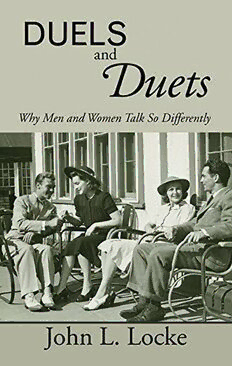
Duels and Duets: Why Men and Women Talk So Differently PDF
Preview Duels and Duets: Why Men and Women Talk So Differently
Duels and Duets Whydo men and womentalk so differently? Andhowdo these differ- encesinterferewith communication between the sexes? What judg- mentsdowomenmakeabout men,based solelyon their speaking voices? Insearchof an answer to these and otherquestions, JohnL. Locketakesthereaderonafascinatingjourney,fromhumanevolution through ancient history to thepresent, revealingwhy men speak as theydowhenattemptingtoimpressorseducewomen,andwhywomen adopt averydifferent wayoftalking when bonding with each other, ordiscussingrivals. When men talk to men, Lockeargues,they frequentlyengage ina type of “dueling,” locking verbal horns with their rivals inawaythat enablesthem tocompetefor the things they need,mainly status and sex.Bycontrast,muchofwomen’stalksoundsmorelikeaverbal“duet,” aharmoniouswayofachievingtheirgoalsbysharingintimatethoughts and feelings inprivate. And because a third,“uni-sex”wayof talking neverevolved, men and womenhavetorelyonthe strategies at their disposal. As Lockeexplains, theircontrasting stylesalsooffermen and womenan important benefit: the ability to collaborate with each other in everydaylife. John L. Locke is currently Professorof LinguisticsatLehman College, CityUniversityof NewYork. Hisarticles haveappeared ina broadrange ofjournals, including the Journalof the RoyalAnthropo- logical Institute, Evolution andHuman Behavior, Behavioraland Brain Sciences, and LanguageSciences. Hehaspublished over100 articles, chapters,andbooks.HisbooksincludeThede-voicingofsociety(1998) and Eavesdropping:an intimate history (2010). Duels and Duets Why Men and Women Talk So Differently JOHN L. LOCKE cambridge university press Cambridge,NewYork,Melbourne,Madrid,CapeTown, Singapore,Sa˜oPaulo,Delhi,Tokyo,MexicoCity CambridgeUniversityPress TheEdinburghBuilding,CambridgeCB28RU,UK PublishedintheUnitedStatesofAmericaby CambridgeUniversityPress,NewYork www.cambridge.org Informationonthistitle:www.cambridge.org/9780521887137 # JohnL.Locke2011 Thispublicationisincopyright.Subjecttostatutoryexception andtotheprovisionsofrelevantcollectivelicensingagreements, noreproductionofanypartmaytakeplacewithout thewrittenpermissionofCambridgeUniversityPress. Firstpublished2011 PrintedintheUnitedKingdomattheUniversityPress,Cambridge AcatalogrecordforthispublicationisavailablefromtheBritishLibrary LibraryofCongressCataloging-in-PublicationData Locke,JohnL. Duelsandduets:whymenandwomentalksodifferently/JohnL.Locke. p. cm. Includesbibliographicalreferencesandindex. ISBN978-0-521-88713-7(Hardback) 1. Oralcommunication–Sexdifferences. 2. Conversationanalysis. I. Title. P96.S48L632011 302.3046–dc22 2011001070 ISBN978-0-521-88713-7Hardback CambridgeUniversityPresshasnoresponsibilityforthepersistenceor accuracyofURLsforexternalorthird-partyinternetwebsitesreferredto inthispublication,anddoesnotguaranteethatanycontentonsuch websitesis,orwillremain,accurateorappropriate. To dispute whether males or females are the higher, is like disputing the relative superiority of animals and plants. Each is higher in its own way, and the two are complementary. Patrick Geddes and John Arthur Thompson Contents Acknowledgments viii List of illustrations ix 1 Speech, sex, and gender 1 2 Duels 23 3 Bards, heroes, Romeos, and clowns 60 4 Why do men duel? 76 5 Duets 102 6 Complicity 117 7 Why do women duet? 132 8 Collaboration in language and in life 162 Notes to chapters 180 References 196 Index 231 vii Acknowledgments I wrote much of this book in the 2009–10 academic year, when IwasonsabbaticalleavefromtheDepartmentofSpeech-Language- HearingSciencesatLehmanCollege,CityUniversityofNewYork. Duringthattime Iwas privilegedto hold a faculty position in the Department of Anthropology at Yale University. I am indebted to severalscholarsfordiscussionsofissuesthatItakeuphere,including Richard Bribiescas and David Watts. On a more personal level, Imustacknowledgeauniqueprivilege.Iammarriedtomymuse. Thankyou,Catherine. John L. Locke Old Lyme, Connecticut viii Illustrations Figure 2.1 The Female Orators (engraved from a painting by John Collett, 1768). [51] Figure 3.1 A“bigman,”orrhetoricthumper,settlinganinter- clandispute(fromReay1959). [66] Figure 4.1 Testosteroneoftrialandnon-triallawyers(from Dabbsetal.1998.Triallawyersandtestosterone:blue-collartalent inawhite-collarworld.JournalofAppliedSocialPsychology, 28:84–94). [95] Figure 5.1 Scene from Le Caquet des Femmes (woodcut, c. 1560, Bibliothe`que Nationale de France, Cabinet des Estampes, Tf. 2, fol. 49, from Mainardi 2003). [103] Figure 6.1 Throat singing by Ainu women (from Malm 1963, p. 242). [120] ix
